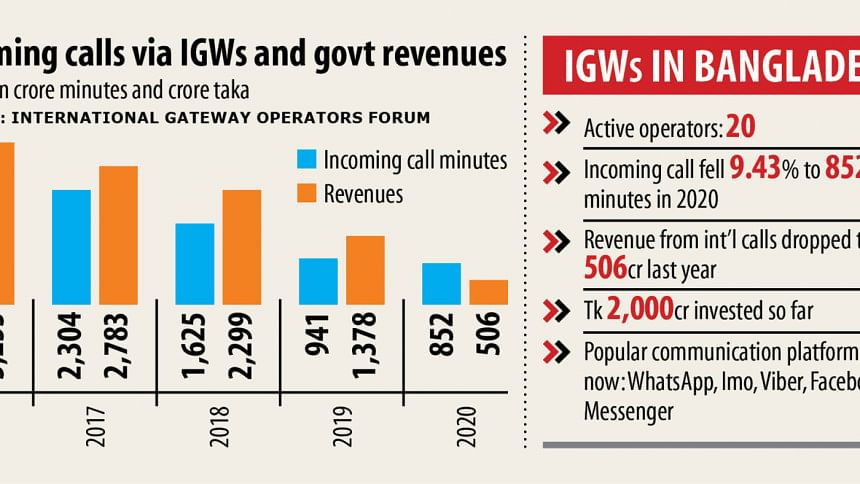Apps spell doom for int’l call operators

International incoming call operators may soon become a thing of the past in Bangladesh because of the increasing use of social media platforms such as WhatsApp, Imo, Viber, and Facebook Messenger.
Although the cost of calls per minute has declined over the years, the number of inbound international calls is decreasing due to the growing popularity of social media apps as they are relatively cost-effective and offer various features, including video calls.
The number of international incoming call minutes fell 9.43 per cent year-on-year to 852.31 crore last year. The decline is about 50 per cent compared to 2018, when it was about 1,625.30 crore minutes, according to a report of the International Gateway Operators Forum, an association of the international gateway operators (IGWs).
In 2016, international calls stood at 2,778.84 crore minutes.
IGW operators are responsible for the termination of international voice calls in Bangladesh.
Mir Nasir Hossain, managing director of Mir Telecom, one of the IGWs, said international operators were going through a crisis.
"International calls have been decreasing drastically for several years. Because of the increased use of OTT apps, the situation in the international calling business is not the same as it was in the past."
Over-the-top communications (OTT) refers to a class of real-time communication solutions that operate over the internet.
The coronavirus pandemic had dealt another blow to the struggling IGWs as the adoption of social media tools accelerated in the last year.
In Bangladesh, the number of internet users rose tremendously because of the pandemic as people have had to use digital platforms to work, shop, communicate and for entertainment.
There are 11.27 crore internet users in the country as of February this year, up from about 10 crore users a year ago and 9.21 crore in the same month in 2019, data from the Bangladesh Telecommunication Regulatory Commission (BTRC) showed.
The use of internet bandwidth rose to 2,400 gbps (gigabits per second) in 2020, up from 1,950 gbps in 2019 and doubling from what it was in 2016.
Smartphone users also saw an uptick, especially during the pandemic, and the penetration of smart-phones is expected to grow further. This will spell further trouble for IGW operators.
Officials of the Bangladesh Telecommunication Regulatory Commission (BTRC) expect the business of IGWs to shrink further in the next few years.
As a result, the government's revenue from the segment will take a hit.
In 2016, the government received Tk 3,253 crore in revenue from international calls. It plummeted to Tk 506 crore last year.
"Because of technological advancement, international calls are declining," said BTRC Chairman Shyam Sunder Sikder.
"We are monitoring the overall situation. Necessary steps will be taken to raise the issue with the government and stakeholders," he said, adding that the commission was more active against illegal VoIP traders.
Voice over internet protocol (VoIP) is a technology that allows users to make voice calls using a broadband internet connection instead of a regular phone line.
Nasir called for policy changes so that the demand for international call routing through IGWs remains the same for some time.
Industry insiders say people's ability to use technology and apps has increased, so they are using many smartphone-based apps to communicate, cutting reliance on voice calls.
At the same time, the increase in the use of illegal VoIP has had an impact on international calls.
In Bangladesh, the IGW business started in 2008 through an open auction. Four private companies got the licence, including the state-owned Bangladesh Telecommunication Company Limited (BTCL).
In April 2012, another 25 new companies got the licence. As a result, an unbalanced competition was created in the sector as many licences are issued simultaneously without verifying the demand, a number of industry insiders said.
Another licence was issued in 2016 and the last one in 2018.
The regulator has scrapped the licences of six operators for non-payment of annual fees and other dues and for not sharing revenue. The companies are Ratul Telecom, KAY Telecommunications, Telex, Vision Tel, Apple Globaltel and Bestech Telecom.
A case was filed against the companies under the Bangladesh Telecommunications Act, 2001, and the Public Demand Recovery Act, 1913.
Now, 22 IGWs, including BTCL are active.
In January last year, the government slashed the international incoming voice call rate by 65.71 per cent to $0.006 per minute in the face of shrinking earnings from the sector in recent years.
At present, 40 per cent of the revenue from international calls goes to the government, 20 per cent to the IGWs, 18.5 per cent to interconnection exchanges (ICX) operators, and 22.5 per cent to mobile phone and landline operators.
Seven IGWs dominate the market: Global Voice, Mir Telecom, Bangla Track, Novo Telecom, Unique Infoway, Digicon Telecommunication, and Roots Communications.
About Tk 2,000 crore has been invested in the sector, according to Mir Nasir.
More than a thousand people were employed by the sector in its heyday but many jobs were cut due to the business downturn.
According to a source, 30 to 50 people used to work in an IGW company in the past. Now it has come down to eight to 15 people. If the current situation persists, more people will lose their jobs.

 For all latest news, follow The Daily Star's Google News channel.
For all latest news, follow The Daily Star's Google News channel. 



Comments